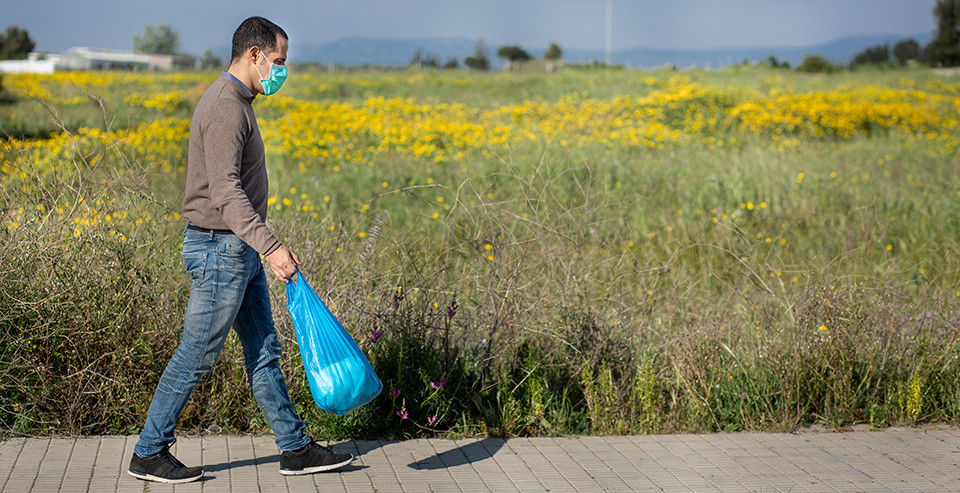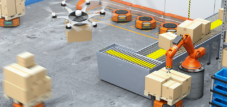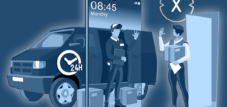Securing basic services in rural regions
Language selection 📢
Published on: September 12, 2020 / update from: September 12, 2020 - Author: Konrad Wolfenstein
How intralogistics ensures basic supplies for the population in rural regions
The trend towards urbanization can also be clearly seen in Germany. Every year, tens of thousands of people move from rural regions to cities, which leads to a constant expansion of metropolitan areas. At the same time, this is leading to a shrinking population in many areas, which presents responsible politicians and companies with new challenges if the basic supply of the rural population with all necessary goods is to be guaranteed. In this article you will find out how logistics can contribute to the solution.
Whether Berlin, Hamburg, Cologne or Munich, Germany's metropolises experience new records in their population numbers every year and a similar scenario is also playing out in other cities. This is no coincidence, as cities in Germany also promise jobs and an infrastructure that provides residents with all the goods they need for everyday life.
But this economic boom in the urbanized regions has a dark side, because at the same time the opposite development can be observed in many rural areas. A kind of rural exodus has long since begun in many parts of the country. This leads to younger, well-educated people in particular leaving the city for the city. Often only the older people are left behind.
Downward spiral due to dwindling population
The steadily declining population often sets in motion a dangerous downward spiral. The affected districts lose valuable economic and purchasing power as a result of the move. As a result, companies have problems meeting their labor needs, which is why they often relocate to areas with more potential.
At the same time, it is becoming increasingly difficult to adequately provide for those left behind. The reason for this is that the income of local retailers and service providers automatically decreases due to reduced demand and purchasing power. The consequence is closing shops and deserted rows of shops due to lower profitability, which in turn encourages more people to leave. Ultimately, this is not only a problem for the remaining population and traders, but also for the often state-run water suppliers and sewage treatment plants, because too few people lead to falling consumption and wastewater volumes. However, these are crucial for maintaining the networks, which ultimately raises the question of whether basic services can still be maintained in these areas. The crucial challenge for planners, politicians and companies is: Where is the way out of this downward spiral?
Logisticians as a development partner for rural regions
DAIFUKU can provide a possible answer to securing basic supplies for the rural population . The Muli Material Handling experts from Japan are world market leaders in their field and have specialized in state-of-the-art storage systems. DAIFUKU 's partially and fully automated solutions provide an important basis for regional supply, as they can be used to efficiently store and provide not only everyday items. The high level of automation of the DAIFUKU solutions also helps ensure that the required goods can be (temporarily) stored in distribution centers at manageable costs and, if necessary, transferred from there to decentralized distribution centers.
► From: “Japan is already working on the future of tomorrow”
The examples mentioned show how much DAIFUKU can contribute to solving this future-oriented question, which determines the future development of regions away from urban centers.
politics
But those responsible on the state government side have long since woken up and taken action to stop the threatening trend and - if possible - even reverse it. Therefore, a wide variety of projects have been launched in many parts of the country to avert population decline.
This is also the case in Rhineland-Palatinate, where the village shop consulting project “M- Punkt RLP” was started in 2010, with an annual subsidy of 250,000 euros. The aim of the initiative is to use advice and assistance to arouse interest in local communities in setting up village and neighborhood shops in order to maintain regional local supplies where the large chains have long since withdrawn with their markets. The communities are supported by advisors from the state government from the initial idea through to the later opening of the business. The great interest in this type of local supply initiative is shown by the fact that around 90 consultations have been carried out every year since it was launched. With visible success, as this has so far led to 34 new openings and support for almost 220 existing village shops.
Another focus is on promoting regional producers and sales communities that are intended to ensure local supplies. In order to increase investment activity, companies can claim eligible costs and have them reimbursed. In this way, for example, it would be possible to build a modern storage infrastructure with subsidies.
But it wasn't just in Rhineland-Palatinate that politicians reacted accordingly. A large number of comparable projects have now been started in other federal states, from Schleswig-Holstein to Baden-Württemberg and Bavaria. What they have in common is that they combine advisory services with financial assistance in order to give regional care a boost.
Politicians have already recognized the impending danger many times and are actively countering it. It is now up to companies to take advantage of government activities and use their own initiatives to revitalize rural areas. Using the systems presented by a provider such as DAIFUKU , it was shown that intralogistics is ideal for securing basic supplies for the population in the affected parts of the country. In this way, it helps to increase the attractiveness of the regions and could not only minimize migration, but also ensure a renaissance of rural areas.
► Contact me or discuss with me on LinkedIn
What will be crucial for the future will be how we secure the infrastructure of our key industries!
Three areas are of particular importance here:
- Digital Intelligence (Digital Transformation, Internet Access, Industry 4.0 and Internet of Things)
- Autonomous power supply (CO2 neutrality, planning security, safety for the environment)
- Intralogistics/logistics (full automation, mobility of goods and people)
Xpert.Digital delivers you here from the Smart AUDA series
- Autonomization of energy supply
- urbanization
- Digital transformation
- Automation of processes
always new information that is updated regularly.



























